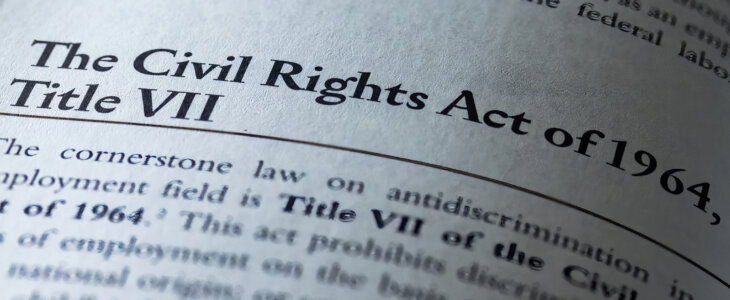State and federal constitutions and statutes grant you various enumerated rights and privileges with the goal of creating an equal playing field for all Americans. Unfortunately, various parties may intentionally or inadvertently violate these so-called civil rights. When you experience a violation, you may have the option to file a civil rights lawsuit.
Understanding Civil Rights Claims
A civil rights claim allows you to pursue compensation or other relief after a party violates your rights under state or federal law. State and federal laws, such as Title VII or IX of the Civil Rights Act, the Americans with Disabilities Act, and the Fair Housing Act, expressly create protections for people in public life. State and federal constitutions also enumerate specific inherent rights that people have. Common examples of civil rights claims include:
- Discrimination claims in the employment, education, housing, financial, or public accommodation context; protected characteristics include race, color, national origin, religious belief, age (over 40), sex/gender, sexual orientation, disability, pregnancy, and veteran status.
- Violations of constitutional rights, including the right to free speech, due process, or equal protection under the law
- Police misconduct, including false arrest, malicious prosecution, or excessive force
People who experience violations of their civil rights may file lawsuits under the various state and federal statutes enumerating those rights. When government officials commit civil rights violations, people may also pursue court actions under Section 1983 of the Civil Rights Act, which expressly creates a cause of action for violations of civil rights committed by people acting under government authority.
When to Consider Filing a Civil Rights Lawsuit
Determining whether you should file a civil rights lawsuit may depend on various factors. First, you must recognize that another party has violated your civil rights, such as when you experience different treatment in employment, housing, education, or public accommodation based on one or more of your protected characteristics, such as your race, gender, or disability, or when the police use excessive or retaliatory force against you. Next, you must assess the consequences you’ve experienced due to the civil rights violation, such as financial losses or emotional/physical injuries.
You can also consider how filing a civil rights lawsuit can help correct systemic or societal issues that led to the violation of your rights, such as parties’ inherent biases or a lack of oversight. You might also consider alternatives to litigation to pursue relief, such as filing complaints with government agencies like the Equal Employment Opportunity Commission, the Department of Housing and Urban Development, or the Department of Justice. In some cases, you may also have the option to pursue alternative dispute resolution, such as when you experience a violation of your rights in the employment, educational, or financial context.
The Process of Filing a Civil Rights Lawsuit
The process of filing a civil rights lawsuit begins with an investigation to document the violation. You should collect evidence such as emails, text messages, employment records, video footage, or witness statements. Remember to keep copies of any formal complaints you’ve filed, such as HR complaints or complaints to state or federal agencies.
Before filing a lawsuit, you can consult a civil rights attorney to understand your legal options and obtain representation in court. An attorney can draft your lawsuit and advocate on your behalf during court hearings or trial.
A civil rights lawsuit begins when you file your complaint in court. Your complaint will set forth the underlying facts of your case and cite the relevant laws you believe the defendant(s) violated. Before trial, the parties will engage in discovery, which involves the exchange of evidence and deposition of witnesses to narrow down issues for trial. Parties may also file pre-trial motions to admit or exclude evidence or obtain summary judgment on various claims or issues. Parties can also participate in negotiations or mediation to pursue settlement. Without a settlement, a civil rights lawsuit will ultimately reach trial where a jury or judge will decide the case.
Contact a Civil Rights Attorney Today
If your civil rights have been violated, you deserve to pursue accountability, compensation, and justice. Let a civil rights attorney from Privette Law Office advocate for your rights and interests. Contact our firm today for a free, confidential consultation with our legal team to discuss your options for pursuing claims against the parties responsible for violating your rights.
